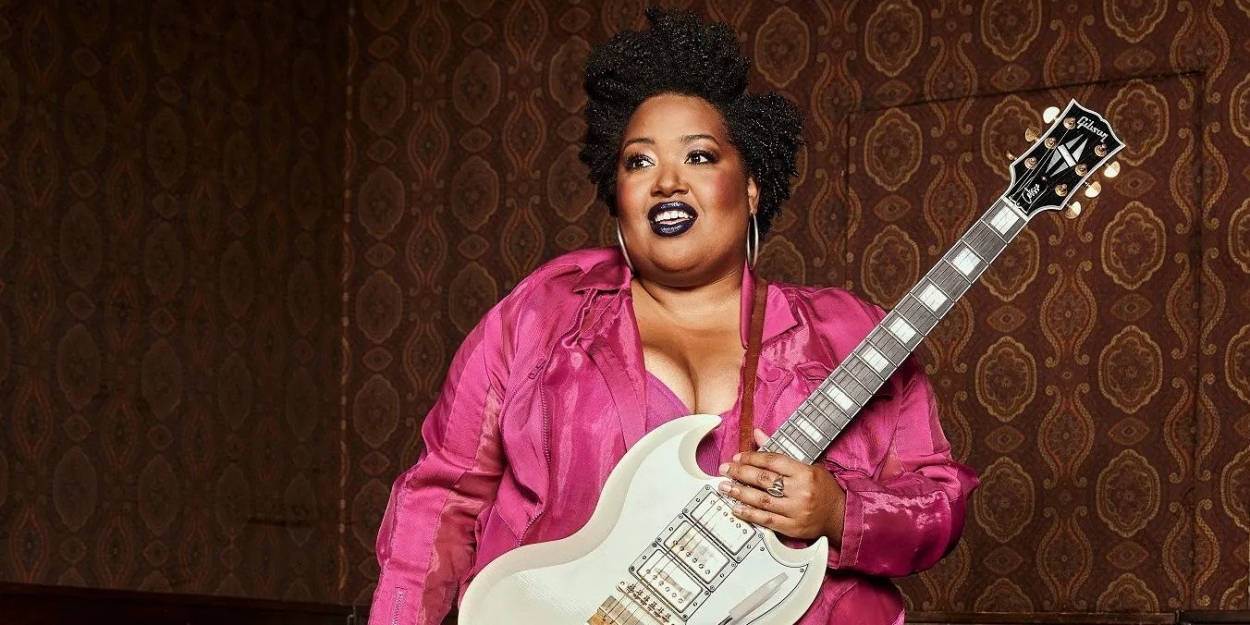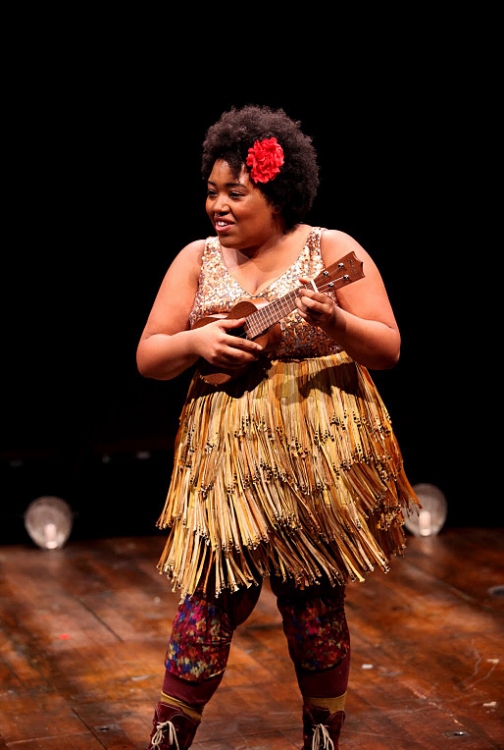Interview: Celisse Reveals How She Created an Opera With No Rules
“When All I Knew Changed” is now available to listen to through Catapult Opera.

R&B artist Celisse has partnered with the new company, Catapult Opera, to create a 30-minute opera and short film entitled “When All I Knew Changed.”
The project is a direct response to her experience with the COVID-19 pandemic. It is told through the eyes of three-women trying to survive with Celisse singing and playing all parts.
After being seen on Broadway in the 2012 revival of Godspell, Celisse has toured with acts like Brandi Carlile, Dave Matthews Band, John Legend, and John Mayer. While diving into the opera world was initially out of her wheelhouse, she soon learned how far she could take her musical ambitions, all while discovering more about human connection.
BroadwayWorld sat down with Celisse to discuss how her musical theatre background contributed to the opera, how she created it, and what its future might be.
I want to start out by asking how you initially got involved in writing this opera, When All I Knew Changed?
I was in a moving truck driving across the country from New York to LA. I was moving towards the end of 2020, so that was like September or October or something of 2020. Neal Goren, the artistic director at Catapult, had seen some of my work online and had been to a show of mine, I suppose, in New York at some point. He reached out to me to ask if I would get on the phone with him. So while I was in that truck driving across, he sort of pitched this idea of me writing an opera and I told him, you know, I really appreciated the ask. I've never done anything like that. I'm not even sure if I could do it.
The whole point of the series of commissions was sort of bringing composers sort of unlikely folks to this medium to see like what it would do to bring a new energy into opera. I ultimately ended up saying yes, partially because I was interested and excited at the idea, and partially because it was 2020 and I needed money. So I was like, "Okay, I'll write an opera."
It's so interesting that you got that call while you were driving across the country. I'm sure you were driving through so many different places, seeing so many different types of people. Did that journey influence this at all? Did it have any impact on your worldview going into this project?
That's a great question. I hadn't really thought directly about the drive and the piece but I mean I will say, because I was making this drive, it was the end of August of 2020, so things were very full swing-Covid, right. So driving across the country, so many of the things that you would normally do and see or restaurants you could go to or whatever, these things weren't open or available. Because of everything, it was kind of like driving through ghost towns, really.
Deciding to make a piece about of our collective experience of the coronavirus felt like even greater fertile ground, so to speak, because of just having that experience. I never connected the dots, but you're probably right. It did influence it.
Like you said before, it was sort of an unlikely pairing, you and an opera. How did you find the sound for the opera?
When Neal and I were speaking about me doing this project, he said, "There are literally no rules other than one. The only thing that I ask is that it would be served being performed or sung by classically trained singers." That was the only directive. Because he said it can really be anything, I was like, okay, well, I'm gonna kinda get weird. Because I'm not coming from this traditional opera composer background. I feel like the worst thing I could do is to try to pretend to be something different than what I am really, right?
So truly when I started on this process, in terms of the music, like actually finding the sounds for everything, I went into my space and pulled out literally every pedal, every weird instrument, like every kind of thing I could find to make sound. Somewhere on social somewhere there's a few pictures of my apartment at that time where literall by my desk I had sort of a semi-circle of pedals and shakers and spoons and like, all kinds of weird shit to just be like, "Well, let's see, let's see what inspires what."
Quite honestly, once I wrote the opening number, it really kind of informed everything else, and it made me feel like I knew the world I wanted things to live in, and I also really wanted it to feel like each woman had their own sonic world, if that makes sense.
We've seen you on Broadway before and you have musical theater experience, so how did that help you through this project?

I love it and all of my best friends are in theater, and I still see plays and shows and look forward to acting again at some point. But, how it informed it is like I learned about narrative through my work in theater for years. I started working professionally in theater when I was 18 years old. I had a lot of years in a good run of work. So I really like to think about things having a beginning, middle, and end and where the piece is currently, I mean, what is sort of out into the world, it's very much a piece that is in process. It's open-ended because the initial commission was just for this to be 10 minutes of music. I think the other two commissions that have happened in this vein were both kind of piano/vocal, very kind of straightforward pieces.
So I think because I didn't know what I was going to create, I'd never done anything like this, once I gone into that process, it grew into a bigger thing and a bigger thing and a bigger thing, and I just felt like I wanted to keep writing. So where we sort of end off, in the music that's currently presented, is sort of where it felt like a good stopping place of. Like, here is almost pretty much 30 minutes of music that gets you into the world of what this could be. There's an open door to keep writing, to do a much longer form piece in the future if that ever makes us do.
Where do you see it going from here? Do you have like anything in mind of how you want to expand it?
Yeah, I have a lot of ideas. In my dream world, I would love to do a short film, to be honest. I love the idea. When I was writing this music, I was thinking about these three women in their spaces almost like West Side Story, like the opening where you think about Maria singing "Tonight," and you see, Maria on the balcony and Tony and that sort of whole montage. Really, truly thinking about our experience in Covid where we're all having these really individual, heart-wrenching experiences, but we're all connected.
I think a really interesting way to tell that story, especially continuing with this idea of how to do opera in a way that is new and fresh, is like what could be done in a medium with film, I think is just so interesting and left from center enough to feel very much in line with what the project wants to be already.
What did you personally take away from creating this project? Both from like a standpoint of expanding your own musical catalog, but also putting your feelings about the pandemic into this project.
So I think on like a musical career, like that lens, it really made me feel like there are a lot more mediums of art that I can play with and express myself in, more than I realized. As I was working on that piece, I had no idea if it was gonna be good, which was sort of what was kind of great about the commission, too. It somewhat low stakes. I don't think the expectation is that I was gonna write something bad, but I think the expectation was just that it would be something new. Not necessarily that I was gonna write some piece that was gonna be groundbreaking and earth shattering, but in the process of writing it, it was like, "Oh, well I do know how to take what I've learned in not only theater and just my work in music in general, but all of this life experience and to infuse it into another medium felt, really exciting and inspiring to think about other ways in which to pursue art.
On the more life spirits level, I think that the project really taught me even more so how much connected we all really are because I ultimately got the source material for all of this work from interviews I did with people, with just people in my life. I called friends and family and colleagues and asked everybody the same five questions. All sort of like, "What has been the most challenging part Covid? What has been the most beautiful part of Covid? What do you feel like you've learned about yourself?" I asked everybody these same questions and you'd be so surprised. The details of of people's experiences would be different, but the themes were the same. The themes of loneliness, the themes of gratitude, the themes of connection, the themes of really understanding how much abundance, we have in our lives in ways that we don't even really realize until it's taken away. It was really a gift to be reminded of what the most important things are really in life by sort of talking to people about their experiences and then trying to communicate that experience through this music.
Listen to "When All I Knew Changed" by Celisse here. Check out her upcoming tour dates here.
Videos

